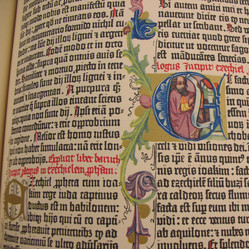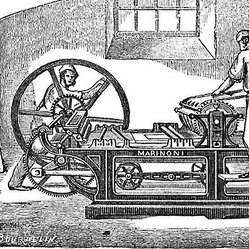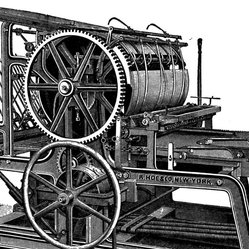
The Living Word
By J.p. Lawrence (Next Section / Previous Section/ Convergence Menu)
In the beginning was the Word, and the Word was with God, and the Word was God. The Word belonged to a hierarchy of priests. A turn of the screw, and Gutenberg brought the Word to the masses. And the sum of human knowledge moved from the oral to the printed word. Thoughts become something to hold and keep, something to own and to read privately.
The impact of moving from quill to printing press rested in allowing access to knowledge both to the elite and to the masses. Mass production allowed Gutenberg to print more than 200 bibles over the course of five years, while a monk would require two years to print a single bible.
Words became accessible for the middle class and lower. Without the Gutenberg press, the Reformation would not have spread so quickly. The written word moved from the litanies of the priesthood to the vernacular of the masses. Ownership of knowledge moved from Rome to private communities, and later to personal will.
The printing press was the delivery mechanism for the printed word, but the revolution wrought by its type was not simply of technology. Lisa Gitelman, a media historian at New York University Steinhardt, said that there are two ways to look at media (Jenkins 13). One of them is media as technology that enable communication, but the other is subtler.

Every medium – spoken word, written word, emails, video – has a set of culturally associated protocols or practices that have evolved around that technology. These protocols affect how both the consumer and the producer think about and interact with a piece of communication. Think about the difference between a break up message via text versus face to face, for example. The sentiments may be the same, but the method of delivery affects so much of meaning and reception.
This definition of media is important for handling the idea of convergence – the idea that the ways in which we interact with knowledge can change and is currently changing toward a world where
1. Media flows from one media channel to another and will be accessible in multiple ways (a newspaper story is covered on the evening news and then on an online blog and then via text message and email).
2. Communication systems are increasingly interdependent (music will align with video, fans will come home from a movie to talk on an online fan community about the tie-in comic and the book it was based on).
3. There are increasingly complex relations between corporate producers (who want to control their story) and fans (who spin new stories from what the producers create). For example: the tension between journalists (who cover an election) and bloggers (who post their own interpretations). (254).

The printing press changed how bibles were made, but it also changed how bibles were perceived. The Word itself became something different. The type of person who was allowed access to creating a book expanded from the elite to anyone who owned a printing press. And it’s not the last time ownership of knowledge shifted from the elite to common. Over the course of history, it appears that transformative mediums like the printed word come packaged with a particular type of anxiety: anxiety over the loss of elite stewardship of the Word, and the fear of Reformation.
Works cited:
Jenkins, Henry. Convergence Culture: Where Old and New Media Collide. New York: New York UP, 2006. Print.